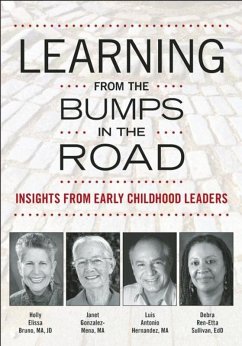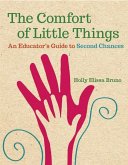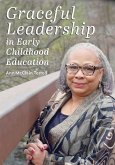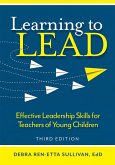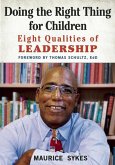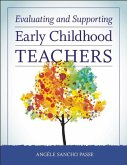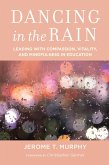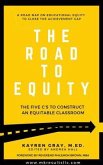Holly Elissa Bruno, Janet Gonzalez-Mena, Luis A. Hernandez, Debra Ren-Etta Sullivan
Learning from the Bumps in the Road (eBook, ePUB)
Insights from Early Childhood Leaders
18,95 €
18,95 €
inkl. MwSt.
Sofort per Download lieferbar

9 °P sammeln
18,95 €
Als Download kaufen

18,95 €
inkl. MwSt.
Sofort per Download lieferbar

9 °P sammeln
Jetzt verschenken
Alle Infos zum eBook verschenken
18,95 €
inkl. MwSt.
Sofort per Download lieferbar
Alle Infos zum eBook verschenken

9 °P sammeln
Holly Elissa Bruno, Janet Gonzalez-Mena, Luis A. Hernandez, Debra Ren-Etta Sullivan
Learning from the Bumps in the Road (eBook, ePUB)
Insights from Early Childhood Leaders
- Format: ePub
- Merkliste
- Auf die Merkliste
- Bewerten Bewerten
- Teilen
- Produkt teilen
- Produkterinnerung
- Produkterinnerung

Bitte loggen Sie sich zunächst in Ihr Kundenkonto ein oder registrieren Sie sich bei
bücher.de, um das eBook-Abo tolino select nutzen zu können.
Hier können Sie sich einloggen
Hier können Sie sich einloggen
Sie sind bereits eingeloggt. Klicken Sie auf 2. tolino select Abo, um fortzufahren.

Bitte loggen Sie sich zunächst in Ihr Kundenkonto ein oder registrieren Sie sich bei bücher.de, um das eBook-Abo tolino select nutzen zu können.
The journey to professional and personal growth takes time, and the road isn't always smooth, but it is a learning-filled adventure
Holly Elissa Bruno, Janet Gonzalez-Mena, Luis Antonio Hernandez, and Debra Ren-Etta Sullivan are accomplished professionals and respected leaders in the early childhood field. After a decade of speaking together at national professional development conferences, they now give you twelve of their most important presentation topics as essays. Each chapter presents a dialogue among the authors about a particular topic and the lessons gleaned from facing and…mehr
- Geräte: eReader
- mit Kopierschutz
- eBook Hilfe
- Größe: 0.43MB
Andere Kunden interessierten sich auch für
![The Comfort of Little Things (eBook, ePUB) The Comfort of Little Things (eBook, ePUB)]() Holly Elissa BrunoThe Comfort of Little Things (eBook, ePUB)15,95 €
Holly Elissa BrunoThe Comfort of Little Things (eBook, ePUB)15,95 €![Graceful Leadership in Early Childhood Education (eBook, ePUB) Graceful Leadership in Early Childhood Education (eBook, ePUB)]() Ann McClain TerrellGraceful Leadership in Early Childhood Education (eBook, ePUB)15,95 €
Ann McClain TerrellGraceful Leadership in Early Childhood Education (eBook, ePUB)15,95 €![Learning to Lead (eBook, ePUB) Learning to Lead (eBook, ePUB)]() Debra Ren-Etta SullivanLearning to Lead (eBook, ePUB)15,95 €
Debra Ren-Etta SullivanLearning to Lead (eBook, ePUB)15,95 €![Doing the Right Thing for Children (eBook, ePUB) Doing the Right Thing for Children (eBook, ePUB)]() Maurice SykesDoing the Right Thing for Children (eBook, ePUB)15,95 €
Maurice SykesDoing the Right Thing for Children (eBook, ePUB)15,95 €![Evaluating and Supporting Early Childhood Teachers (eBook, ePUB) Evaluating and Supporting Early Childhood Teachers (eBook, ePUB)]() Angèle Sancho PasseEvaluating and Supporting Early Childhood Teachers (eBook, ePUB)15,95 €
Angèle Sancho PasseEvaluating and Supporting Early Childhood Teachers (eBook, ePUB)15,95 €![Dancing in the Rain (eBook, ePUB) Dancing in the Rain (eBook, ePUB)]() Jerome T. MurphyDancing in the Rain (eBook, ePUB)25,95 €
Jerome T. MurphyDancing in the Rain (eBook, ePUB)25,95 €![The Road To Equity (eBook, ePUB) The Road To Equity (eBook, ePUB)]() Kayren GrayThe Road To Equity (eBook, ePUB)27,95 €
Kayren GrayThe Road To Equity (eBook, ePUB)27,95 €-
-
-
The journey to professional and personal growth takes time, and the road isn't always smooth, but it is a learning-filled adventure
Holly Elissa Bruno, Janet Gonzalez-Mena, Luis Antonio Hernandez, and Debra Ren-Etta Sullivan are accomplished professionals and respected leaders in the early childhood field. After a decade of speaking together at national professional development conferences, they now give you twelve of their most important presentation topics as essays. Each chapter presents a dialogue among the authors about a particular topic and the lessons gleaned from facing and overcoming uncertainty and obstacles.
Merging each author's distinct voice, expertise, and life experiences, this collection unveils the authors' personal and meaningful histories, insecurities, and insights. You will be encouraged and challenged to think more deeply and openly about your own practices and philosophies. You will gain a renewed sense of purpose as you help children reach their full potentials. And you will discover-as the authors did-that every bump in the road is an invitation to grow and opportunity to learn.
Holly Elissa Bruno, MA, JD; Janet Gonzalez-Mena, MA; Luis Antonio Hernandez, MA; and Debra Ren-Etta Sullivan, EdD, are acclaimed keynote speakers, authors, and experts on a variety of topics in early childhood.
Holly Elissa Bruno, Janet Gonzalez-Mena, Luis Antonio Hernandez, and Debra Ren-Etta Sullivan are accomplished professionals and respected leaders in the early childhood field. After a decade of speaking together at national professional development conferences, they now give you twelve of their most important presentation topics as essays. Each chapter presents a dialogue among the authors about a particular topic and the lessons gleaned from facing and overcoming uncertainty and obstacles.
Merging each author's distinct voice, expertise, and life experiences, this collection unveils the authors' personal and meaningful histories, insecurities, and insights. You will be encouraged and challenged to think more deeply and openly about your own practices and philosophies. You will gain a renewed sense of purpose as you help children reach their full potentials. And you will discover-as the authors did-that every bump in the road is an invitation to grow and opportunity to learn.
Holly Elissa Bruno, MA, JD; Janet Gonzalez-Mena, MA; Luis Antonio Hernandez, MA; and Debra Ren-Etta Sullivan, EdD, are acclaimed keynote speakers, authors, and experts on a variety of topics in early childhood.
Dieser Download kann aus rechtlichen Gründen nur mit Rechnungsadresse in A, D ausgeliefert werden.
Produktdetails
- Produktdetails
- Verlag: Redleaf Press
- Seitenzahl: 240
- Erscheinungstermin: 21. Juni 2013
- Englisch
- ISBN-13: 9781605542607
- Artikelnr.: 39064654
- Verlag: Redleaf Press
- Seitenzahl: 240
- Erscheinungstermin: 21. Juni 2013
- Englisch
- ISBN-13: 9781605542607
- Artikelnr.: 39064654
- Herstellerkennzeichnung Die Herstellerinformationen sind derzeit nicht verfügbar.
Holly Elissa Bruno: Holly Elissa Bruno, MA, JD, is an author, attorney, professor, acclaimed keynote speaker, and host of an online radio program. She is an alumna of Harvard University's Institute for Educational Management, teaches leadership courses for The McCormick Center for Early Childhood Leadership and Wheelock College, and is a frequent contributor to Child Care Information Exchange and the National Association for the Education of Young Children's Young Children publication. Previously, Holly Elissa served as Assistant Attorney General for the state of Maine and Assistant Dean at the University of Maine School of Law. Holly Elissa's books include What You Need to Lead an Early Childhood Program: Emotional Intelligence in Practice and Managing Legal Risks in Early Childhood Programs.
Janet Gonzalez-Mena: Janet Gonzalez-Mena, MA, is a highly respected early childhood consultant, trainer, infant specialist, diversity specialist, and writer. She taught in the California community college system for more than thirty years and is currently part of the faculty for WestEd's Program for Infant Toddler Care (PITC) and Beginning Together, a training program for adults working with children with special needs. She is the author of Diversity in Early Care and Education: Honoring Differences; 50 Strategies for Working with and Communicating with Diverse Families; Infants, Toddlers, and Caregivers, Ninth Edition; and Basics of Developmentally Appropriate Practice: An Introduction for Teachers of Infants and Toddlers. Janet has a master in arts degree in human development from Pacific Oaks College.
Luis A. Hernandez: Luis A. Hernandez, MA, T/TAS Early Childhood Education Specialist, is an active member of many professional organizations that support children and family interests. He is active in the accreditation process with the National Association for the Education of Young Children, where he is also creating professional and leadership development opportunities. He serves on the Board of the Parent Services Project in California, the Advisory Board of the McCormick Tribune Center for Early Childhood Leadership, and the United Way's Center for Excellence in Early Childhood. Luis writes for Child Care Information Exchange and is a frequent keynote speaker at national, state, and local conferences. He holds a master of arts degree in bilingual/multicultural education.
Debra Ren-Etta Sullivan: Debra R. Sullivan, EdD, is the cofounder and president of Praxis Institute for Early Childhood Education. She has more than twenty-five years of experience in higher education as a teacher, researcher, and administrator. Debra holds a doctorate in educational leadership, and a master's degree in curriculum and instruction. She is the author of Learning to Lead: Effective Leadership Skills for Teachers of Young Children, Second Edition.
Janet Gonzalez-Mena: Janet Gonzalez-Mena, MA, is a highly respected early childhood consultant, trainer, infant specialist, diversity specialist, and writer. She taught in the California community college system for more than thirty years and is currently part of the faculty for WestEd's Program for Infant Toddler Care (PITC) and Beginning Together, a training program for adults working with children with special needs. She is the author of Diversity in Early Care and Education: Honoring Differences; 50 Strategies for Working with and Communicating with Diverse Families; Infants, Toddlers, and Caregivers, Ninth Edition; and Basics of Developmentally Appropriate Practice: An Introduction for Teachers of Infants and Toddlers. Janet has a master in arts degree in human development from Pacific Oaks College.
Luis A. Hernandez: Luis A. Hernandez, MA, T/TAS Early Childhood Education Specialist, is an active member of many professional organizations that support children and family interests. He is active in the accreditation process with the National Association for the Education of Young Children, where he is also creating professional and leadership development opportunities. He serves on the Board of the Parent Services Project in California, the Advisory Board of the McCormick Tribune Center for Early Childhood Leadership, and the United Way's Center for Excellence in Early Childhood. Luis writes for Child Care Information Exchange and is a frequent keynote speaker at national, state, and local conferences. He holds a master of arts degree in bilingual/multicultural education.
Debra Ren-Etta Sullivan: Debra R. Sullivan, EdD, is the cofounder and president of Praxis Institute for Early Childhood Education. She has more than twenty-five years of experience in higher education as a teacher, researcher, and administrator. Debra holds a doctorate in educational leadership, and a master's degree in curriculum and instruction. She is the author of Learning to Lead: Effective Leadership Skills for Teachers of Young Children, Second Edition.
Introduction
Our Way to Sincerity: Affirming Civility and Tolerance in Our Daily Work
Janet Gonzalez-Mena writing the intro.
Our profession challenges us with diverse human temperaments, cultures, and
situations that hinge on the expression of sincerity and authenticity. The
intent of this conversation is to consider the appropriate next steps,
based on healthy individual attitudes that lead to dynamic social and
emotional relationships. Let's learn to cultivate trust and possibilities.
Intentionality for the Well-Intended
Debra R. Sullivan writing the intro.
Intentionality is the power of minds to be about, to represent, or to stand
for, things, properties and states of affairs. We examine intent and having
the mind and will focused on a specific purpose, intention and what one has
in mind to do or bring about, and good intention that can result in a
negative outcome.
Technology: Reflecting On Resistance and Habits on the Way to Dynamic
Change
Debra R. Sullivan writing the intro.
A discussion on what technology is doing to us instead of doing for us.
This includes a reflection on the impact of technology on personal and
professional growth and its implication on social/emotional development; an
analysis of the uses and abuses of technology on daily life, specifically
on future leadership development; a discussion on how technology can
transform teacher and staff preparation; and ideas on how to control the
information clutter and install selective and meaningful uses.
Social/Emotional Competence: Are You Smarter Than A 2-Year-Old?
Janet Gonzalez-Mena writing the intro.
We need good emotional health to learn and to learn how to learn. This is
an opportunity for you to discuss the three main models of Emotional
Intelligence, reflect on the impact and influence emotions have had on you,
learn what every 2-year-old knows about emotions, and develop strategies to
increase your EI.
Creating the Village: Building Relationships That Support Children
Debra R. Sullivan writing the intro.
It takes a village to raise a child, but what does it take to create a
village? Every grown-up has a valued, understood role in the education,
health, welfare, growth, and development of the children who live there.
Creating the village in early childhood care and education happens when you
create relationships, interactions, and activities that turn parents,
teachers, and the community into a team that is effective and efficient at
meeting the needs of the children and families they serve.
C.A.T. Spells Success: Curriculum, Assessment, and Teaching for Quality
Learning Environments
Luis A. Hernandez writing the intro.
What you teach matters, but how you teach it matters more. What you do
counts, but how do you count what you do? Learning environments influence
children's success, but how do your values influence the learning
environment? Let's focus on the intersection of curriculum, assessment, and
learning and strategies for making sure you're accomplishing what you set
out to do.
Reflecting on our Bumps in the Road
Holly Elissa Bruno writing the intro.
Michael Jordan, reflecting on his career, observed: "I've missed more than
9000 shots in my career. I've lost almost 300 games. Twenty-six times I've
been trusted to take the game's winning shot and missed. I've failed over
and over and over again in my life and that is why I succeed." When
children stumble, have difficulty learning, or can't make friends easily,
we support them. We teach children how to learn from their mistakes. Why
are we, then, so hard on ourselves for making mistakes? Imagine if we could
learn from the bumps in our road, let go and move on?
From the Universal to the Uniform: Considering Cultural and Diversity
Standards Across Our Personal and Professional Connections
Luis A. Hernandez writing the intro.
Playing for Keeps
Holly Elissa Bruno writing the intro.
Power: Teaching What We (un)Learn About Sharing and Withholding Power
Holly Elissa Bruno writing the intro.
We have all been schooled in the unwritten rules of dominance and
subordinance in organizations. Here, we identify what we need to unlearn
about traditional power dynamics, and envision ways to share power with
those different from us and across differences. Together, we will create
strategies on how to lead the way to equitable learning communities for
all.
Tomorrow's Children Today: A Self-Assessment Approach To Multicultural
Readiness
Janet Gonzalez-Mena writing the intro.
A code of ethical conduct holds us all to the standard of mutual respect
and empowerment. We seek through anti-bias curricula to create respectful,
open environments where children are empowered to become their freest and
best. Yet, we adults often experience or witness the disempowerment of
those who are "different" because of race, gender, ethnicity, orientation,
class, belief system, ability, and originality. This discussion is about
naming the dynamics of power that we learned, visioning the dynamics of
truly shared power, and creating strategies together on how to lead the way
to equitable learning communities for all.
The Great Imposter: Unmasking the Burden of Self Doubts in Our Professional
Lives
Luis A. Hernandez writing the intro.
Most teachers and professionals in early childhood are competent people who
can have moments of doubts as to their skills and competence. The
discussion will affirm that while we may have certain weaknesses, it is
imperative that improvement and constant learning be part of a professional
process. It is imperative to focus on strengths, claim credit for small and
big success stories, recognized tasks that are accomplished, and reflection
on positive engagement and relationships.
Our Way to Sincerity: Affirming Civility and Tolerance in Our Daily Work
Janet Gonzalez-Mena writing the intro.
Our profession challenges us with diverse human temperaments, cultures, and
situations that hinge on the expression of sincerity and authenticity. The
intent of this conversation is to consider the appropriate next steps,
based on healthy individual attitudes that lead to dynamic social and
emotional relationships. Let's learn to cultivate trust and possibilities.
Intentionality for the Well-Intended
Debra R. Sullivan writing the intro.
Intentionality is the power of minds to be about, to represent, or to stand
for, things, properties and states of affairs. We examine intent and having
the mind and will focused on a specific purpose, intention and what one has
in mind to do or bring about, and good intention that can result in a
negative outcome.
Technology: Reflecting On Resistance and Habits on the Way to Dynamic
Change
Debra R. Sullivan writing the intro.
A discussion on what technology is doing to us instead of doing for us.
This includes a reflection on the impact of technology on personal and
professional growth and its implication on social/emotional development; an
analysis of the uses and abuses of technology on daily life, specifically
on future leadership development; a discussion on how technology can
transform teacher and staff preparation; and ideas on how to control the
information clutter and install selective and meaningful uses.
Social/Emotional Competence: Are You Smarter Than A 2-Year-Old?
Janet Gonzalez-Mena writing the intro.
We need good emotional health to learn and to learn how to learn. This is
an opportunity for you to discuss the three main models of Emotional
Intelligence, reflect on the impact and influence emotions have had on you,
learn what every 2-year-old knows about emotions, and develop strategies to
increase your EI.
Creating the Village: Building Relationships That Support Children
Debra R. Sullivan writing the intro.
It takes a village to raise a child, but what does it take to create a
village? Every grown-up has a valued, understood role in the education,
health, welfare, growth, and development of the children who live there.
Creating the village in early childhood care and education happens when you
create relationships, interactions, and activities that turn parents,
teachers, and the community into a team that is effective and efficient at
meeting the needs of the children and families they serve.
C.A.T. Spells Success: Curriculum, Assessment, and Teaching for Quality
Learning Environments
Luis A. Hernandez writing the intro.
What you teach matters, but how you teach it matters more. What you do
counts, but how do you count what you do? Learning environments influence
children's success, but how do your values influence the learning
environment? Let's focus on the intersection of curriculum, assessment, and
learning and strategies for making sure you're accomplishing what you set
out to do.
Reflecting on our Bumps in the Road
Holly Elissa Bruno writing the intro.
Michael Jordan, reflecting on his career, observed: "I've missed more than
9000 shots in my career. I've lost almost 300 games. Twenty-six times I've
been trusted to take the game's winning shot and missed. I've failed over
and over and over again in my life and that is why I succeed." When
children stumble, have difficulty learning, or can't make friends easily,
we support them. We teach children how to learn from their mistakes. Why
are we, then, so hard on ourselves for making mistakes? Imagine if we could
learn from the bumps in our road, let go and move on?
From the Universal to the Uniform: Considering Cultural and Diversity
Standards Across Our Personal and Professional Connections
Luis A. Hernandez writing the intro.
Playing for Keeps
Holly Elissa Bruno writing the intro.
Power: Teaching What We (un)Learn About Sharing and Withholding Power
Holly Elissa Bruno writing the intro.
We have all been schooled in the unwritten rules of dominance and
subordinance in organizations. Here, we identify what we need to unlearn
about traditional power dynamics, and envision ways to share power with
those different from us and across differences. Together, we will create
strategies on how to lead the way to equitable learning communities for
all.
Tomorrow's Children Today: A Self-Assessment Approach To Multicultural
Readiness
Janet Gonzalez-Mena writing the intro.
A code of ethical conduct holds us all to the standard of mutual respect
and empowerment. We seek through anti-bias curricula to create respectful,
open environments where children are empowered to become their freest and
best. Yet, we adults often experience or witness the disempowerment of
those who are "different" because of race, gender, ethnicity, orientation,
class, belief system, ability, and originality. This discussion is about
naming the dynamics of power that we learned, visioning the dynamics of
truly shared power, and creating strategies together on how to lead the way
to equitable learning communities for all.
The Great Imposter: Unmasking the Burden of Self Doubts in Our Professional
Lives
Luis A. Hernandez writing the intro.
Most teachers and professionals in early childhood are competent people who
can have moments of doubts as to their skills and competence. The
discussion will affirm that while we may have certain weaknesses, it is
imperative that improvement and constant learning be part of a professional
process. It is imperative to focus on strengths, claim credit for small and
big success stories, recognized tasks that are accomplished, and reflection
on positive engagement and relationships.
Introduction
Our Way to Sincerity: Affirming Civility and Tolerance in Our Daily Work
Janet Gonzalez-Mena writing the intro.
Our profession challenges us with diverse human temperaments, cultures, and
situations that hinge on the expression of sincerity and authenticity. The
intent of this conversation is to consider the appropriate next steps,
based on healthy individual attitudes that lead to dynamic social and
emotional relationships. Let's learn to cultivate trust and possibilities.
Intentionality for the Well-Intended
Debra R. Sullivan writing the intro.
Intentionality is the power of minds to be about, to represent, or to stand
for, things, properties and states of affairs. We examine intent and having
the mind and will focused on a specific purpose, intention and what one has
in mind to do or bring about, and good intention that can result in a
negative outcome.
Technology: Reflecting On Resistance and Habits on the Way to Dynamic
Change
Debra R. Sullivan writing the intro.
A discussion on what technology is doing to us instead of doing for us.
This includes a reflection on the impact of technology on personal and
professional growth and its implication on social/emotional development; an
analysis of the uses and abuses of technology on daily life, specifically
on future leadership development; a discussion on how technology can
transform teacher and staff preparation; and ideas on how to control the
information clutter and install selective and meaningful uses.
Social/Emotional Competence: Are You Smarter Than A 2-Year-Old?
Janet Gonzalez-Mena writing the intro.
We need good emotional health to learn and to learn how to learn. This is
an opportunity for you to discuss the three main models of Emotional
Intelligence, reflect on the impact and influence emotions have had on you,
learn what every 2-year-old knows about emotions, and develop strategies to
increase your EI.
Creating the Village: Building Relationships That Support Children
Debra R. Sullivan writing the intro.
It takes a village to raise a child, but what does it take to create a
village? Every grown-up has a valued, understood role in the education,
health, welfare, growth, and development of the children who live there.
Creating the village in early childhood care and education happens when you
create relationships, interactions, and activities that turn parents,
teachers, and the community into a team that is effective and efficient at
meeting the needs of the children and families they serve.
C.A.T. Spells Success: Curriculum, Assessment, and Teaching for Quality
Learning Environments
Luis A. Hernandez writing the intro.
What you teach matters, but how you teach it matters more. What you do
counts, but how do you count what you do? Learning environments influence
children's success, but how do your values influence the learning
environment? Let's focus on the intersection of curriculum, assessment, and
learning and strategies for making sure you're accomplishing what you set
out to do.
Reflecting on our Bumps in the Road
Holly Elissa Bruno writing the intro.
Michael Jordan, reflecting on his career, observed: "I've missed more than
9000 shots in my career. I've lost almost 300 games. Twenty-six times I've
been trusted to take the game's winning shot and missed. I've failed over
and over and over again in my life and that is why I succeed." When
children stumble, have difficulty learning, or can't make friends easily,
we support them. We teach children how to learn from their mistakes. Why
are we, then, so hard on ourselves for making mistakes? Imagine if we could
learn from the bumps in our road, let go and move on?
From the Universal to the Uniform: Considering Cultural and Diversity
Standards Across Our Personal and Professional Connections
Luis A. Hernandez writing the intro.
Playing for Keeps
Holly Elissa Bruno writing the intro.
Power: Teaching What We (un)Learn About Sharing and Withholding Power
Holly Elissa Bruno writing the intro.
We have all been schooled in the unwritten rules of dominance and
subordinance in organizations. Here, we identify what we need to unlearn
about traditional power dynamics, and envision ways to share power with
those different from us and across differences. Together, we will create
strategies on how to lead the way to equitable learning communities for
all.
Tomorrow's Children Today: A Self-Assessment Approach To Multicultural
Readiness
Janet Gonzalez-Mena writing the intro.
A code of ethical conduct holds us all to the standard of mutual respect
and empowerment. We seek through anti-bias curricula to create respectful,
open environments where children are empowered to become their freest and
best. Yet, we adults often experience or witness the disempowerment of
those who are "different" because of race, gender, ethnicity, orientation,
class, belief system, ability, and originality. This discussion is about
naming the dynamics of power that we learned, visioning the dynamics of
truly shared power, and creating strategies together on how to lead the way
to equitable learning communities for all.
The Great Imposter: Unmasking the Burden of Self Doubts in Our Professional
Lives
Luis A. Hernandez writing the intro.
Most teachers and professionals in early childhood are competent people who
can have moments of doubts as to their skills and competence. The
discussion will affirm that while we may have certain weaknesses, it is
imperative that improvement and constant learning be part of a professional
process. It is imperative to focus on strengths, claim credit for small and
big success stories, recognized tasks that are accomplished, and reflection
on positive engagement and relationships.
Our Way to Sincerity: Affirming Civility and Tolerance in Our Daily Work
Janet Gonzalez-Mena writing the intro.
Our profession challenges us with diverse human temperaments, cultures, and
situations that hinge on the expression of sincerity and authenticity. The
intent of this conversation is to consider the appropriate next steps,
based on healthy individual attitudes that lead to dynamic social and
emotional relationships. Let's learn to cultivate trust and possibilities.
Intentionality for the Well-Intended
Debra R. Sullivan writing the intro.
Intentionality is the power of minds to be about, to represent, or to stand
for, things, properties and states of affairs. We examine intent and having
the mind and will focused on a specific purpose, intention and what one has
in mind to do or bring about, and good intention that can result in a
negative outcome.
Technology: Reflecting On Resistance and Habits on the Way to Dynamic
Change
Debra R. Sullivan writing the intro.
A discussion on what technology is doing to us instead of doing for us.
This includes a reflection on the impact of technology on personal and
professional growth and its implication on social/emotional development; an
analysis of the uses and abuses of technology on daily life, specifically
on future leadership development; a discussion on how technology can
transform teacher and staff preparation; and ideas on how to control the
information clutter and install selective and meaningful uses.
Social/Emotional Competence: Are You Smarter Than A 2-Year-Old?
Janet Gonzalez-Mena writing the intro.
We need good emotional health to learn and to learn how to learn. This is
an opportunity for you to discuss the three main models of Emotional
Intelligence, reflect on the impact and influence emotions have had on you,
learn what every 2-year-old knows about emotions, and develop strategies to
increase your EI.
Creating the Village: Building Relationships That Support Children
Debra R. Sullivan writing the intro.
It takes a village to raise a child, but what does it take to create a
village? Every grown-up has a valued, understood role in the education,
health, welfare, growth, and development of the children who live there.
Creating the village in early childhood care and education happens when you
create relationships, interactions, and activities that turn parents,
teachers, and the community into a team that is effective and efficient at
meeting the needs of the children and families they serve.
C.A.T. Spells Success: Curriculum, Assessment, and Teaching for Quality
Learning Environments
Luis A. Hernandez writing the intro.
What you teach matters, but how you teach it matters more. What you do
counts, but how do you count what you do? Learning environments influence
children's success, but how do your values influence the learning
environment? Let's focus on the intersection of curriculum, assessment, and
learning and strategies for making sure you're accomplishing what you set
out to do.
Reflecting on our Bumps in the Road
Holly Elissa Bruno writing the intro.
Michael Jordan, reflecting on his career, observed: "I've missed more than
9000 shots in my career. I've lost almost 300 games. Twenty-six times I've
been trusted to take the game's winning shot and missed. I've failed over
and over and over again in my life and that is why I succeed." When
children stumble, have difficulty learning, or can't make friends easily,
we support them. We teach children how to learn from their mistakes. Why
are we, then, so hard on ourselves for making mistakes? Imagine if we could
learn from the bumps in our road, let go and move on?
From the Universal to the Uniform: Considering Cultural and Diversity
Standards Across Our Personal and Professional Connections
Luis A. Hernandez writing the intro.
Playing for Keeps
Holly Elissa Bruno writing the intro.
Power: Teaching What We (un)Learn About Sharing and Withholding Power
Holly Elissa Bruno writing the intro.
We have all been schooled in the unwritten rules of dominance and
subordinance in organizations. Here, we identify what we need to unlearn
about traditional power dynamics, and envision ways to share power with
those different from us and across differences. Together, we will create
strategies on how to lead the way to equitable learning communities for
all.
Tomorrow's Children Today: A Self-Assessment Approach To Multicultural
Readiness
Janet Gonzalez-Mena writing the intro.
A code of ethical conduct holds us all to the standard of mutual respect
and empowerment. We seek through anti-bias curricula to create respectful,
open environments where children are empowered to become their freest and
best. Yet, we adults often experience or witness the disempowerment of
those who are "different" because of race, gender, ethnicity, orientation,
class, belief system, ability, and originality. This discussion is about
naming the dynamics of power that we learned, visioning the dynamics of
truly shared power, and creating strategies together on how to lead the way
to equitable learning communities for all.
The Great Imposter: Unmasking the Burden of Self Doubts in Our Professional
Lives
Luis A. Hernandez writing the intro.
Most teachers and professionals in early childhood are competent people who
can have moments of doubts as to their skills and competence. The
discussion will affirm that while we may have certain weaknesses, it is
imperative that improvement and constant learning be part of a professional
process. It is imperative to focus on strengths, claim credit for small and
big success stories, recognized tasks that are accomplished, and reflection
on positive engagement and relationships.
